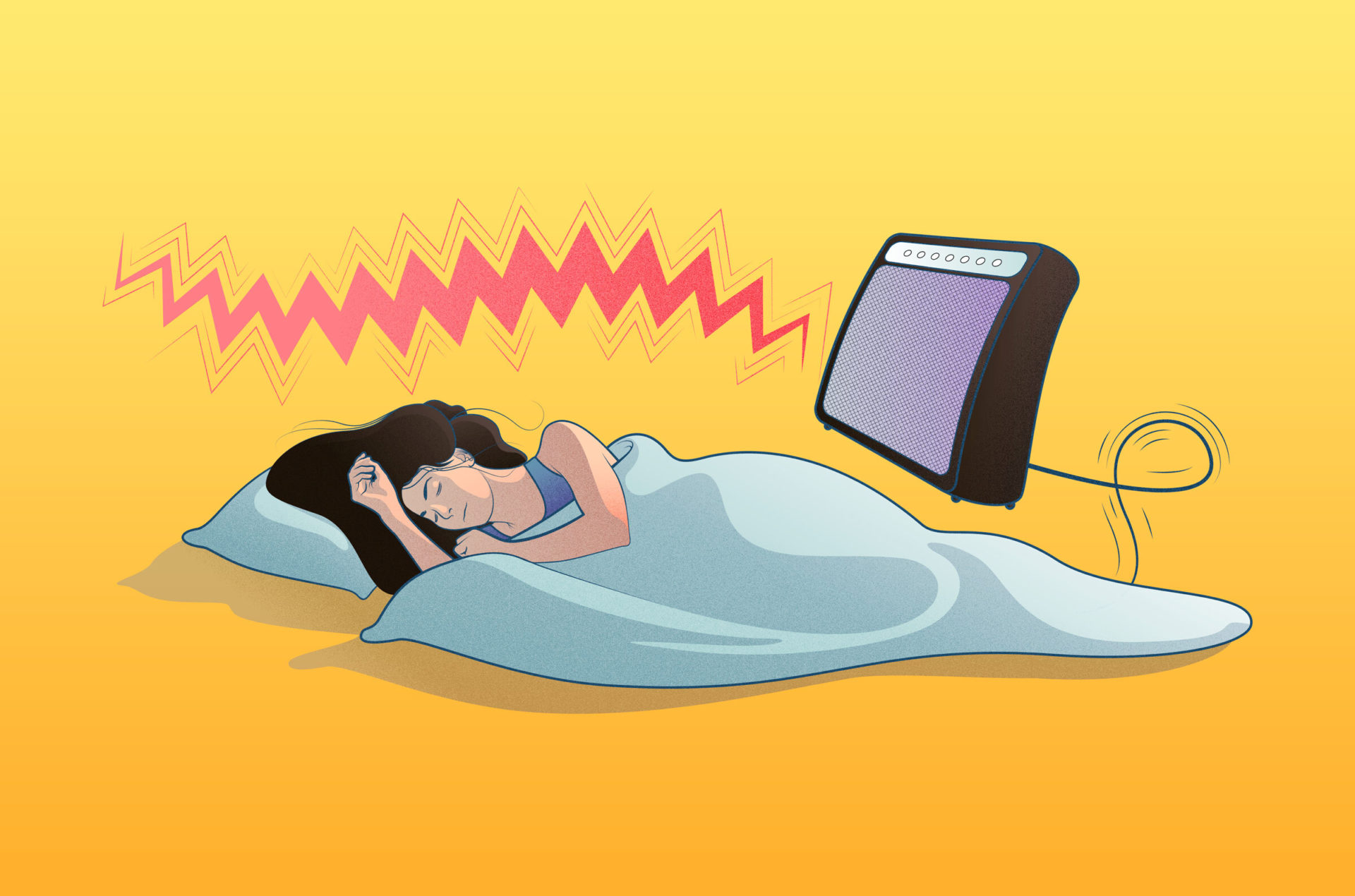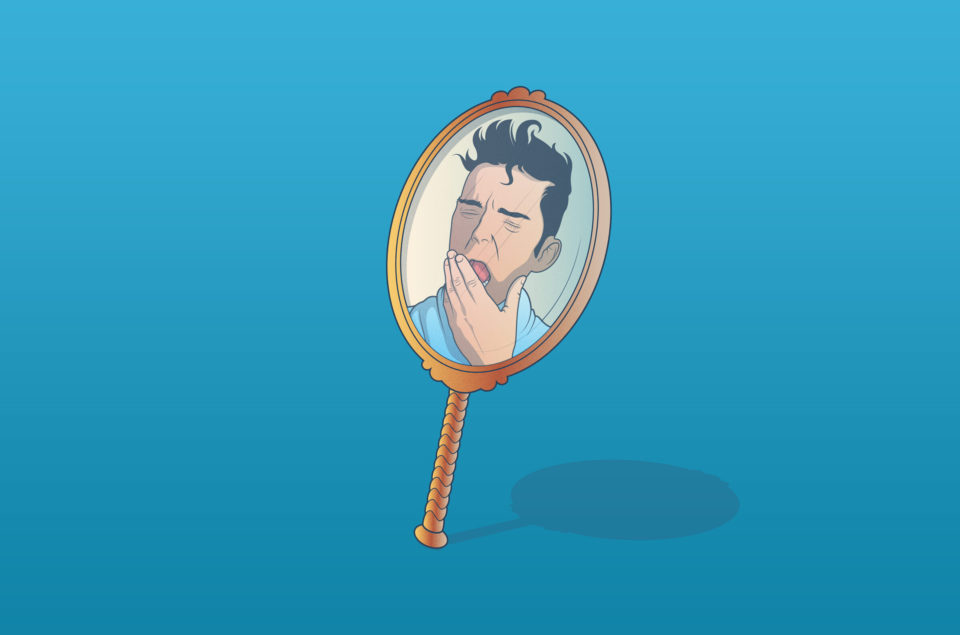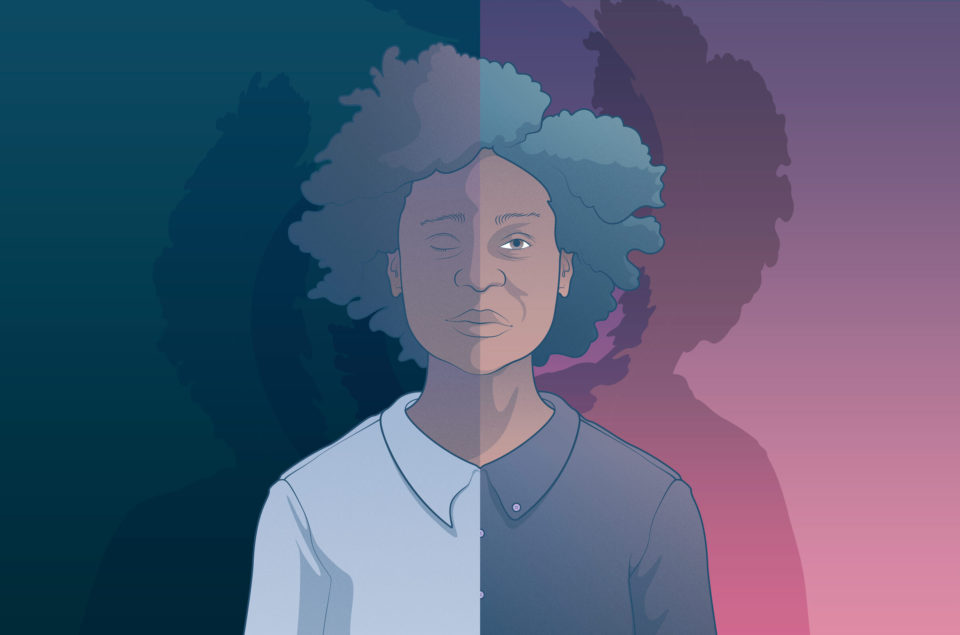If you never wake up to the sound of a fire truck or ambulance, and not even a bang could disturb your slumber, you may be a heavy sleeper. Indeed, heavy sleepers have difficulty waking up and may feel sleepy throughout the day, even when they are getting enough sleep. But what makes a heavy sleeper and what is the best way to wake them up? If you are one or live with one, it is beneficial to understand what keeps them from waking up refreshed, rested and on time, and to find out what you can do about it.
In this article, we cover:
Why am I such a heavy sleeper?
Many people may wonder why they are such heavy sleepers. Although science hasn’t yet figured out why some people have a higher arousal threshold than others – a term that describes how much stimulus you need to wake up – research suggests that heavy sleepers may produce more sleep spindles than light sleepers. These sleep spindles correspond to a form of brain activity that occurs during deep sleep and makes a person more tolerant of noises. Therefore, it could be easier to wake up a heavy sleeper if they’re in light sleep stages, but more challenging if they are in deep sleep.
However, some other factors can also contribute to this condition:
- Genetics: Studies have shown that certain genes can make a person more likely to be a heavy or light sleeper. If you have a family member who is a heavy sleeper, you may be one as well.
- Sleeping disorders: Certain sleeping disorders, such as sleep apnea, can cause a person to be a heavy sleeper. Sleep apnea is a condition where a person’s breathing is interrupted during sleep, causing them to wake up briefly and disrupt their sleep.
- Lifestyle habits and medication: Habits such as drinking alcohol, using sedatives, or taking certain medications can cause a person to be a heavy sleeper. Alcohol and sedatives can cause a person to fall asleep faster, but they also disrupt sleep quality, making it harder to wake up in the morning.
- Lack of physical activity: People who are not physically active during the day tend to be heavy sleepers. Regular physical activity can help improve sleep quality, making it easier to wake up in the morning.
- Sleep deprivation: People who don’t get enough sleep or have irregular sleep patterns are more likely to be heavy sleepers. This is because their body is not getting the right amount of sleep it needs to function properly, making them more likely to feel groggy and disoriented upon waking.
It’s important to note that there may be other underlying medical conditions that can also contribute to being a heavy sleeper, and consulting a specialist is the first step in identifying them.
Is heavy sleeping bad, then?
Whether or not heavy sleeping is considered bad or a disadvantage depends on the individual and their specific situation. For some people, being a heavy sleeper may not cause any significant problems. However, for others, it can lead to issues such as difficulty getting to work or school on time, missing important appointments or events, and even being in danger if they sleep through important alarms or warnings.
Additionally, heavy sleepers are at an increased risk of suffering from sleep inertia, as they are thought to spend more time in deep and REM sleep and tend to wake up during these. They may feel groggy, disoriented and fatigued throughout the day. This can impact their work and social life along with causing issues for relatives and friends. Regardless of the cause, if the condition affects their overall health and life quality, it is important to address and treat it as soon as possible to prevent further consequences. It is also worth mentioning that heavy sleeping can be a symptom of other health conditions such as depression, hypothyroidism, and more.
Does snoring mean deep sleep? Do heavy sleepers snore more?
Snoring is not necessarily more common in heavy sleepers. Not all heavy sleepers snore, and not all snorers are heavy sleepers. Snoring can occur during any stage of sleep and it can be a symptom of a sleep disorder, obesity, alcohol consumption, certain medications, or nasal congestion.
Do deep sleepers sleep more?
Heavy sleepers don’t necessarily sleep more than others, but as mentioned, they may have a harder time waking up and staying awake, even after getting enough sleep. Heavy sleepers may require more time to fully become alert, even after getting the same amount of sleep as someone who is not a heavy sleeper.
How to stop being a heavy sleeper
How you can stop being a heavy sleeper will depend on what is really causing the condition. As previously mentioned, improving sleep habits and addressing any underlying sleep disorders can, generally speaking, help improve your sleep quality and reduce the effects of being a deep sleeper. Some ways to do this include:
- Establish a regular sleep schedule: Going to bed and waking up at the same time every day, even on weekends, can help regulate the body’s sleep-wake cycle and improve sleep quality. In the Sleep Cycle app, you can use the “Sleep Goal” feature to help you get that necessary regular sleep.
- Create a comfortable sleep environment: Having a cool, dark, and quiet room can help improve the chances of falling asleep and staying asleep.
- Develop a bedtime routine: Engaging in activities such as reading, listening to calming music, or taking a warm bath before bedtime can help prepare the body for sleep.
- Avoid caffeine, nicotine, and alcohol before bedtime: These substances can disrupt sleep and make it harder to fall asleep and stay asleep.
- Practice relaxation techniques: Techniques such as deep breathing, meditation, or yoga can help reduce stress and anxiety, which can contribute to better sleep.
- Power nap if you feel tired: naps during the day can help a heavy sleeper stay alert and get the necessary energy to face the day. But remember that naps longer than 20-30 minutes can make it harder to wake up later on.
- Exercise and get some sunlight: both improve sleep quality and reinforce the natural circadian rhythm.
- Consulting a sleep specialist: A sleep specialist can help identify and address what may be contributing to heavy sleeping.
Can a heavy sleeper become a light sleeper?
The possibility that a heavy sleeper becomes a light sleeper will depend on the cause and other factors. Being a light sleeper isn’t better than being a heavy sleeper and vice versa. Both are different conditions that need to be addressed if they affect your sleep quality, life quality and overall health.
Although this also depends on the reason why someone is a heavy sleeper, there could be several factors that could contribute to a lower arousal threshold, such as changes in environment or lifestyle, stress, and certain medical conditions. For example, moving to a new location, or starting a new job with different hours can disrupt the body’s internal clock and make it more difficult to fall asleep and stay asleep throughout the night. Certain medical conditions, such as stress or anxiety can cause changes in sleep patterns. Certain medications can also cause fragmented or restless sleep.
Moreover, age can also play a role in how much we sleep or the quality of sleep. As we age, our sleep patterns may change and we may become lighter sleepers.
How to wake up a heavy sleeper
Waking up a heavy sleeper or starting your day on time, refreshed and rested if you are one of them can be challenging. But there are several strategies that can help (and no, it’s not directly splashing cold, ice water on them or using a loud, persistent alarm clock):
- Use a smart alarm clock: Yes, a foreseeable drawback for heavy sleepers is sleeping through an alarm. However, a smart alarm clock like the one in the Sleep Cycle app ensures that you wake up in your lightest sleep phase, making it easier and avoiding the sleep inertia that characterizes heavy sleepers.
- Place your phone under the bed: the Sleep Cycle app can track your sleep even if you place your phone under the bed. This way, it would be more challenging for you to snooze or stop the alarm and will help you be more wakeful.
- Take advantage of natural light: opening the curtains or blinds to let natural light into the room can help signal to the body that it’s time to wake up, suppressing melatonin levels and increasing serotonin, a hormone that also helps you feel alert and awake. If it’s still really dark when you need to wake up, you can get smart light bulbs that will slowly get brighter according to the time you set.
- Find a scent that stimulates you: the smell of coffee, breakfast, or the perfume that your partner or yourself wear in the morning can help stimulate the heavy sleeper and get them out of bed.
- Establish a morning routine: morning routines are as important as bedtime routines, and can also help you reset your circadian rhythm, improve your focus, mood and energy. For example, by including a small breakfast or an activity to look forward to early in the morning, your body will “ask” or crave that and wake you up naturally.
It’s important to note that what works for one person may not work for another, so it may take some experimentation to find the best individual strategy.
Understanding heavy sleeping
Understanding what it really means to be a heavy sleeper and knowing the causes is essential in order to address any potential issues and improve overall health, wellbeing and sleep quality. Heavy sleeping is, in general, not dangerous for your overall health but it can become frustrating if that affects daily activities or life in general. It’s important to note that while some people may naturally sleep more, excessive sleepiness during the day may be a sign of an underlying sleep disorder, such as sleep apnea. Consulting a healthcare provider can help to identify the underlying cause and develop a treatment plan.










